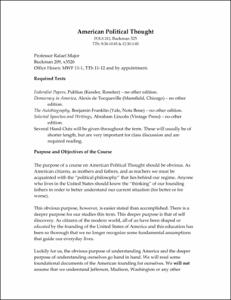Please use this identifier to cite or link to this item:
http://hdl.handle.net/10267/1598Full metadata record
| DC Field | Value | Language |
|---|---|---|
| dc.contributor.author | Major, Rafael | - |
| dc.date.accessioned | 2008-04-07T19:48:52Z | - |
| dc.date.available | 2008-04-07T19:48:52Z | - |
| dc.date.issued | 2008-04-07T19:48:52Z | - |
| dc.identifier.uri | http://hdl.handle.net/10267/1598 | - |
| dc.description | This syllabus was submitted to the Rhodes College Office of Academic Affairs by the course instructor. | en_US |
| dc.description.abstract | Thepurpose�of�a�course�on�American�Political�Thought�should�be�obvious.�As�American�citizens,�as�mothers�and�fathers,�and�as�teachers�we�must�be�acquainted�with�the���political�philosophy���that�lies�behind�our�regime.�Anyone�who�lives�in�the�United�States�should�know�the���thinking���of�our�founding�fathers�in�order�to�better�understand�our�current�situation�(for�better�or�for�worse).��This�obvious�purpose,�however,�is�easier�stated�than�accomplished.�There�is�a�deeper�purpose�for�our�studies�this�term.�This�deeper�purpose�is�that�of�self�discovery.�As�citizens�of�the�modern�world,�all�of�us�have�been�shaped�or�educated�by�the�founding�of�the�United�States�of�America�and�this�education�has�been�so�thoroughthat�we�no�longer�recognize�some�fundamental�assumptions�that�guide�our�everyday�lives.��Luckily�for�us,�the�obvious�purpose�of�understanding�America�and�the�deeper�purpose�of�understanding�ourselves�go�hand�in�hand.�We�will�read�some�foundational�documents�of�the�American�founding�for�ourselves.�We�will�not�assume�that�we�understand�Jefferson,�Madison,�Washington�or�any�other� founder�simply�because�we�took�a�High�School�or�Junior�High�Civics�course.�We�will�not�assume�we�already�know�what�it�means�to�be�an�American�because�most�of�us�were�lucky�enough�to�be�born�here.�We�will�not�assume�we�have�some�privileged�point�of�criticism�because�we�know�the�personal�failings�of�any�founder.�In�essence,�we�will�not�assume�anything����we�will�read�for�ourselves�and�judge�for�ourselves.����A�crucial�aspect�of�this�course�will�be�to�sharpen�our�reading�skills.�If�we�are�to�understand�these�men,�we�must�have�faith�that�they�expressed�their�thought�in�a�meaningful�way.�Coming�to�know�an�author�through�reading�can�be�as�exciting�as�getting�to�know�a�good�friend.�In�this�sense,�a�book�is�more�than�ink�and�paper,�it�is�a�gift�left�by�the�greatest�minds�in�order�to�school�future�generations�(you)����about�life,�liberty,�and�the�pursuit�of�happiness.� | en_US |
| dc.language.iso | en_US | en_US |
| dc.publisher | Memphis, Tenn. : Rhodes College | en_US |
| dc.relation.ispartofseries | Syllabi CRN | - |
| dc.relation.ispartofseries | 17300 | - |
| dc.rights | Rhodes College owns the rights to the archival digital images in this repository. Images are made available for educational use only and may not be used for any non-educational or commercial purpose. Approved educational uses include private research and scholarship, teaching, and student projects. For additional information please contact archives@rhodes.edu. Fees may apply. | - |
| dc.subject | Political Science, Department of | en_US |
| dc.subject | Syllabus | en_US |
| dc.subject | Curriculum | en_US |
| dc.subject | Academic departments | en_US |
| dc.subject | Text | en_US |
| dc.subject | 2006 Fall | en_US |
| dc.title | POLS 212-01, American Political Thought, Fall 2006 | en_US |
| dc.type | Syllabus | en_US |
| Appears in Collections: | Course Syllabi | |
Files in This Item:
| File | Description | Size | Format | |
|---|---|---|---|---|
| 2006_fall_POLS_212-01_.pdf | 178.11 kB | Adobe PDF |  View/Open |
Items in DSpace are protected by copyright, with all rights reserved, unless otherwise indicated.